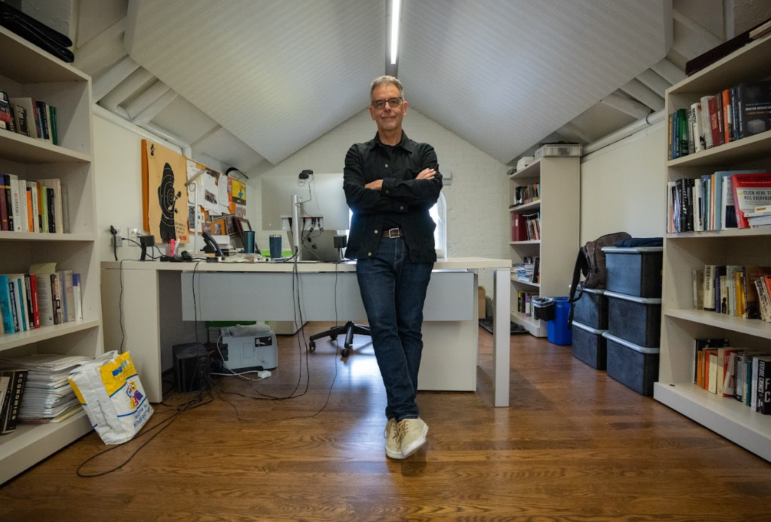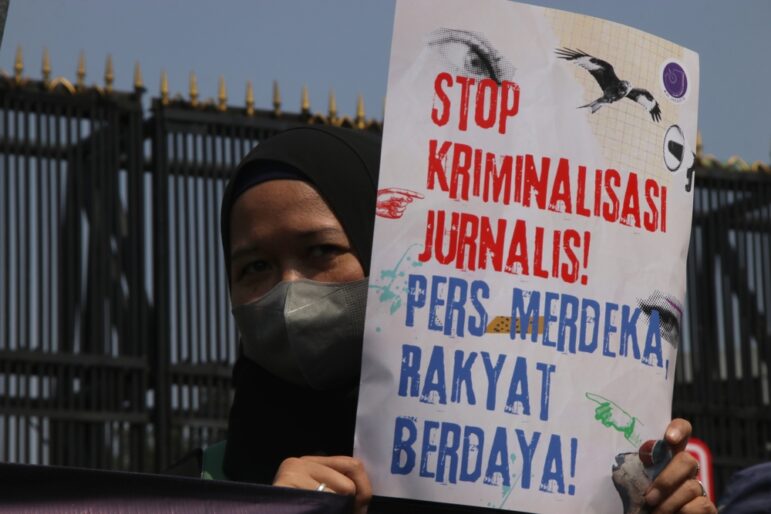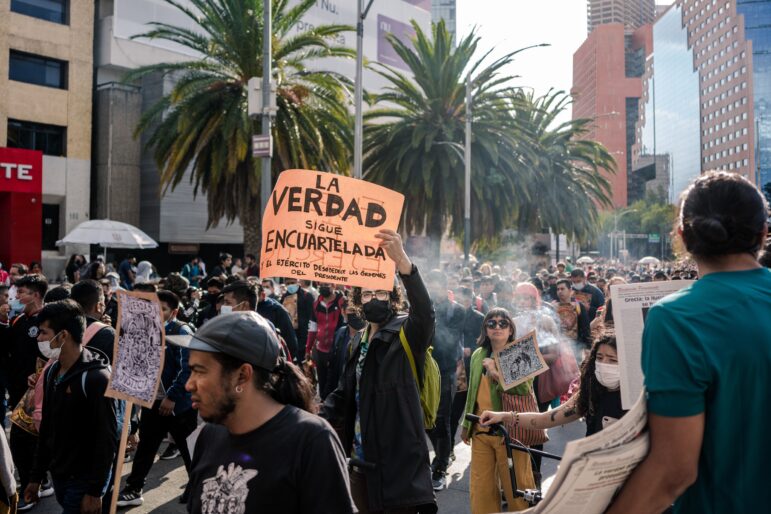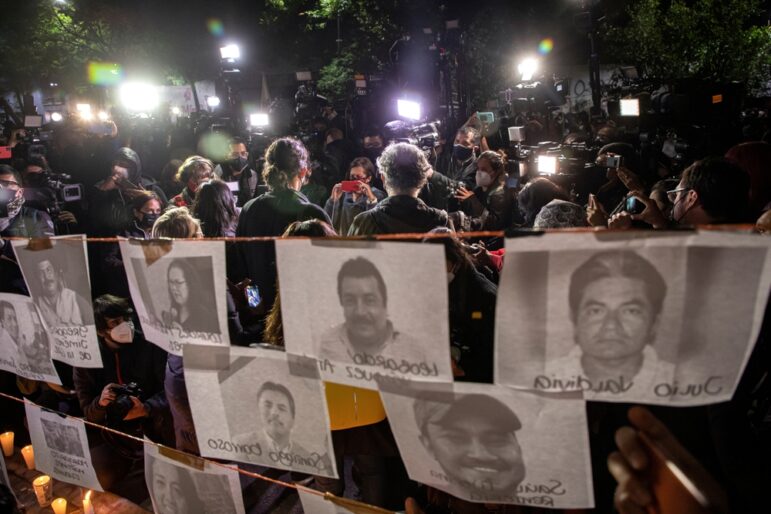

From left: Christoph Schüchner, Murali Perumal, Gerti Drassl, and Lavinia Nowak as the editorial team of Austrian investigative outlet Dossier. Image: Marcel Urlaub / Volkstheater
‘Theater, Fact-Checked:’ Investigative Journalism on Stage
“I was taught at the very beginning of my journalistic career that there are groups in Austria that are rarely reported on critically. And if you do, expect resistance. From inside and outside.”
This line is part of an early monologue in the play “Die Redaktion,” a collaboration between Vienna’s Volkstheater and the Vienna-based investigative journalism outlet Dossier. The character who delivers it is the counterpart to Dossier editor-in-chief Florian Skrabal. (The German term redaktion refers to an editorial staff or office, as well as the process of editing.)
The play is a fact-based dramatization of the experiences of Dossier journalists, adapted from their reporting on the Vienna-based oil and gas multinational OMV — Austria’s biggest company by revenue — and traces the events and financial challenges following the subsequent SLAPP suits brought by OMV. Among other elements, the team had looked into its controversial takeover deal with a shareholder — and what the partially state-owned energy firm invests in. As the Dossier team on stage tells the audience: “This is your money.”
“Die Redaktion” premiered at the Volkstheater in April 2023. It’s an intimate and informal production, with a cast of four sharing the stage only with beer crates that serve as both office furniture and bar tables, and screen projectors that display the documents and research that buttressed their reporting. The sparse scenes contrast with the red velvet and gold layer-cake interior of the neo-Renaissance Volkstheater (“Peoples’ Theater”), founded in 1889. With 830 seats, it is one of the German-speaking world’s biggest theaters.

Vienna’s 830-seat Volkstheater was built in 1889 to provide an alternative to the imperial court theater, now known as the National Theater. Image: Tamara Glen
The four actors alternate between addressing the audience informally and re-enacting key events, providing a window into Dossier’s eventful 2020-2023 years, covering their initial reporting cold calls; editorial brainstorming sessions; awkward COVID-era Zoom meetings; deadline scrambles; meetings with whistleblowers in smoky bars; the bombshell of the lawsuits and the subsequent tension and doom. (The actors notify the audience when any scenes have fictional elements.)
Spoiler alert: One of the final acts retells how OMV dropped the lawsuits in April 2021 — thanks in part to widespread public criticism. As Dossier founding editor, Florian Skrabal, explained to the OCCRP in September 2021: “The reputational damage to OMV was greater for filing the lawsuits in the first place, regardless of the outcome of the court case.”
Another plot point in the play’s closing scenes is that Dossier’s membership and crowdfunding campaign launched in the months following the lawsuits brought in a record number of new members. “Many of them wrote to us directly saying that they had never heard of us, but if OMV hits us, then they want to help,” said Skrabal’s stage persona.
The numbers are impressive: 3,000 new members signed up in less than three weeks — after they had racked up fewer than 2,000 paying members over the previous nine years.
The theater version of the investigation is still bringing in new memberships — but at a smaller scale. “After every play, after every performance, new members join,” says Dossier chief reporter Ashwien Sankholkar. If they get new members around 10:00 p.m. on a weekend, and they haven’t published any breaking stories or a new edition of the magazine, it’s probable that those new members have just seen the play, he explains.
‘Family, Friends, and Fools’
Dossier — a member of GIJN and the OCCRP — operates from a ground-floor apartment of a residential block in Vienna’s lively 4th district. Florian Skrabal, who previously worked for the daily broadsheet Die Presse, founded Dossier with four others in 2012, “out of necessity,” he says. “There is not enough independent journalism in Austria that allows for longer research.”

The Dossier team at Vienna’s Parliament in May 2023, where they received the Concordia Prize for outstanding journalistic achievement, awarded annually by the Austrian Press Club Concordia. Image: Courtesy of Parlamentsdirektion / Ulrike Wieser
In Austria, legacy media, in particular, depends on government and private advertising — known as inserate — to function, which makes them vulnerable to various forms and tendrils of influence, including punitive measures like a pointed lack of ad spending. According to an International Press Institute (IPI) report, in 2018 the Austrian government’s direct ad spending was roughly three times the amount of the (already dwindling) public subsidies to the press. The IPI report also cites studies that show how an imbalance in public advertising spending in Austria disproportionately benefits tabloid media.
Dosser’s debut investigation in 2014 dug into advertising corruption, and they also have an ongoing series on the topic. The practice of politicians injecting hundreds of millions of euros into the media through ads creates an unhealthy dependency that threatens both press freedom and democracy, Dossier points out.
“We were the first to describe the topic in great detail,” says Sankholkar, who joined Dossier in 2019. “I believe we have the largest journalistic collection on the subject of advertising corruption in Austria, which the WKStA [the Central Public Prosecutor’s Office for Combating Economic Crime and Corruption of Austria] has used in its ongoing investigations, and which has informed their understanding of what is going on.”
Dossier operates without ads of any kind. After launching with self-funding, and then operating from a “family, friends, and fools” funding model, in 2018 Skrabal and his team launched a paid magazine to supplement their free online content. The magazine comes out four times a year, with each issue focused on deep, multi-faceted reporting on one topic.
They are also funded through a membership model. As of mid-February 2024, they had around 5,600 members paying various tiers of annual fees, starting at €65 (US$70).

Dossier publishes four print magazines annually. Shown here, an issue focusing on terror and political violence. Image: Courtesy of Dossier
Over the last decade, Dossier has reported on RedTube, the porn site empire that discreetly operated from a historic building in one of Vienna’s storied shopping streets; on the weapons caches Austrian far-right groups are building up; and the marketing machine behind energy drink Red Bull, Austria’s best-known brand and perhaps most successful export (after Arnold Schwarzenegger).
Dossier makes a point of collaborating and sharing its resources with various partners. In 2017 it co-produced — with the Viennese weekly newspaper, Falter — an award-winning animated graphic novel, “Supernaked,” that tells the story of one of Austria’s biggest recent corruption scandals, involving a former finance minister and the government sell-off of 60,000 public apartments.
“We cooperate in a modern, innovative sense,” says Sankholkar. That ethos is how Dossier has become a “vanguard” of investigative theater in Austria, and Europe.
‘Theater Is Not a One-Way Street’
Dossier’s relationship with the Volkstheater started around the end of 2019, explains Sankholkar, when the theater’s incoming artistic director, Kay Voges, a German theater and opera director with an interest in digital media, approached them in search of an independent media partner.
Playwright Calle Fuhr, who directed “Die Redaktion,” was part of the management team that took over the Volkstheater in 2020. He says that central to their ideas for the theater was cooperation: “Dossier was a stroke of luck,” says Fuhr. “Because Dossier is financially independent from major donors, it was clear that we could see eye-to-eye. Right from the first meeting — this was before COVID — there was a spark, and it was clear that we would go a long way together.”
“In our understanding, theater is not a one-way street that simply leads from the stage to the audience,” says Fuhr. “Rather, it is in constant interaction with the city population. We wanted to work with people who had a similar understanding of democracy, and knew [Vienna] well.”
The first product of the Volkstheater-Fuhr-Dossier collaboration was 2021’s “Heldenplätze” (Heroes’ Places or Heroes’ Square). This production examined Austria’s complicated relationship with a skiing legend, following allegations of sexual abuse and a coverup dating back to the 1970s that arose after the skier had died.

From left: Christoph Schüchner, Gerti Drassl, Murali Perumal, and Lavinia Nowak. The cast of four delivers the prologue to Die Redaktion, set in February 2020, describing the editorial meeting in which they first discussed reporting on the Austrian oil and gas company OMV. Image: Marcel Urlaub / Volkstheater
Fuhr has regularly worked with journalists to tell stories on stage, including with German investigative outlet CORRECTIV, with whom he produced the theater piece “Das Kraftwerk” (The Power Plant) based on their reporting on coal energy and water scarcity, which premiered in September 2023.
Volkstheater director Voges was also involved in bringing CORRECTIV’s recent bombshell undercover investigation into the secret far-right meeting in Potsdam to the stage, co-producing a staged reading of the investigation that was live-streamed, free, from the Berlin Ensemble theater in January and simultaneously screened at the Volkstheater.
Theater, Fact-Checked
Though investigative journalism offers some narrative advantages that suit the stage theater, there are also some notable challenges. Sankholkar describes the process as an “exciting [game of] ping-pong… between the journalist and theater producer.”
Theater can bring out the emotion and tension in the reporting that isn’t always evoked in the straightforward text of an investigative story. “A theater creator asks, ‘Well, what was that like, exactly? Did you make contact?’” Sankholkar explains. “And they ask about a lot of things that I couldn’t write into the story because, from our point of view, they were too detailed and not crucial for journalistic storytelling.”
He adds: “The Volkstheater wants to make good theater, we want to stick to the truth and the facts. And of course that can be softened. But if both have this fixed foundation, the results can be striking. It’s a win-win-win situation for artists, journalists, and the audience.”
Director Calle Fuhr suggests that above all, journalism and theater can bring attention to each other. “By bringing journalistic research to the stage in the theater, it draws in completely different circles. At the same time, we benefit in the theater because people who support Dossier are curious about what we are trying out.”

Dossier chief reporter Ashwien Sankholkar’s stage counterpart: actor Murali Perumal. Image: Marcel Urlaub / Volkstheater
Fuhr explains that the biggest obstacle in converting these events to the stage is how to talk about investigative reports, research results, and the research process in an accessible, lively, and entertaining way, without taking away the complexity. “As soon as we start scandalizing for dramatic purposes, we get into populism. It’s a fine line. That’s why the theater scripts go through the Dossier fact-check every time, so we can be 100% sure that everything we say on stage is accurate.”
Fuhr says working with Dossier involves a very close exchange: he sat together with Ashwien Sankholkar and the other Dossier editors for several weeks. “To be able to talk about the research in a well-founded manner, I have to understand the entire cosmos.”
Dossier was also very close to rehearsals with actors, he adds. They were always present at rehearsals and the cast was also able to get an insight into the Dossier editorial team. “This collaboration at eye level, which is based primarily on trust and respect for each other’s work, is essential,” said Fuhr.
“Hopefully this doesn’t seem boastful,” adds Fuhr. “But the [theater] evenings with Dossier are among the Volkstheater’s bestsellers. ‘Heldenplätze’ ran 40 times so far — that’s unusual for Austria.”
Amazingly, response from OMV staff has been quite positive, observes Sankholkar — and the play has even led to an unusual truce. The Dossier team took the bold step of offering OMV staff members — who number around 20,000 — a special discount on tickets. In a surprising turn, they also managed to get testimonials from former and current high-level OMV staff who attended, which are featured on the play’s website to encourage employees who might have been fearful of watching it to do so.
The Show, Going On
Looking ahead, the Austrian media faces an uphill battle. The far-right FPÖ party, which has been hostile to the Austrian press for a long time, is polling in first place ahead of the autumn 2024 elections. According to IPI, Austria is one of the worst countries in the EU for transparency. But in 2025 this is due to change, as the country will finally implement a freedom of information law. This represents a big first step toward dislodging Austria’s long-held doctrine of Amtsgeheimnis — official secrecy — which is baked into the constitution and has often been used to block access to information related to government work.
“But the question that arises is: ‘How will the law be lived?’” asks Dossier editor-in-chief Skrabal. Over the century, Austria has been steeped in a culture of secrecy, he explains. “A new culture of transparency and freedom of information, as exists in other countries such as Sweden and the US, is overdue.”
Meanwhile, Dossier and Fuhr’s next piece for the Volkstheater premieres on March 16 and is already sold out. The roots of that story — the collapse of an Austrian property and retail investor’s empire — stretch back decades, but it’s also still developing, with new headlines on the issue in Austrian and international press appearing almost daily.
“I’m interested in the systems behind [the subjects],” says Fuhr, referring to powerful, behind-the-scenes networks featured in “Heldenplätze” and “Die Redaktion.” “If we want to shape the future, we have to make systemic improvements. And that’s what it’s all about for me.”
The next performance of “Die Redaktion” is on March 9. Dossier and the Volkstheater’s next production, “Auftstieg und Fall des Herrn René Benko,” premieres March 16.
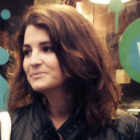 Alexa van Sickle is an associate editor for GIJN and a journalist and editor with experience across online and print journalism, book publishing, and think tanks. Before joining GIJN, she was senior editor for the foreign correspondence magazine Roads & Kingdoms, editing and writing features and producing the magazine’s award-winning podcast.
Alexa van Sickle is an associate editor for GIJN and a journalist and editor with experience across online and print journalism, book publishing, and think tanks. Before joining GIJN, she was senior editor for the foreign correspondence magazine Roads & Kingdoms, editing and writing features and producing the magazine’s award-winning podcast.





